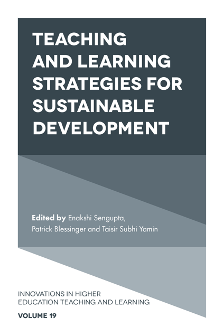Campus as a Living Laboratory (CLL)
, 11, 214
case studies of research and learning
, 218
CIRS
, 217–218
education and engagement
, 219–220
enablers and impact of CLL on campus
, 223–224
large-scale research projects
, 221–223
small scope research studies
, 220–221
sustainability at UBC
, 214–216
types of opportunities
, 218–219
UBC CLL
, 216–217
Campus Sustainability Office (CSO)
, 215
Capacity building programs
, 5
Centre for Interactive Research on Sustainability (CIRS)
, 217–218
Chief executive officer (CEO)
, 163
“Closed-loop” PjBL
, 67–68
Cognitive functioning
, 24
Collective awareness and attention
, 22–23
Community
college
, 145–148, 151
community-oriented approaches
, 61–62, 68
engagement
, 118
learning
, 170
Concept map (Cmap)
, 64–65, 68
Confidence gap
, 9, 190, 192
Contextualization for sustainability
, 69
Corporate social responsibility (CSR)
, 147
Corporate sustainability (CS)
, 147
Critical openness
, 200–202
video dialogues as mechanism for
, 206–208
Cultural commons
, 17, 20
embracing
, 20–21
revitalization of
, 21
Curriculum
, 59, 75, 78
strategies
, 4, 6
structure, focus, and history
, 132–133
sustainability in
, 79
Early College High School (ECHS)
, 149
Eco-centric and Anthropocentric Attitudes toward Environment scale (EAAT SD)
, 126
Ecojustice curriculum framework
, 19
embracing cultural commons
, 20–21
redressing conceptions of intelligence
, 21–23
Ecojustice Leadership Academy
, 17–18
Ecological/ecology
, 21, 44
of democracy
, 86
dimension of SD
, 188
Footprint analysis
, 215
intelligence
, 22
Economic
inclusion
, 163
market system
, 144
sustainability
, 188
Education
, 5, 16, 154, 160–161, 163, 172
adult
, 170
civic
, 165–166, 172
in FHS
, 169
forms of
, 167–168
free adult provision
, 172
gender disparities in
, 171
rural residents in accessing
, 165
Education 2030 Framework for Action
, 160, 171
Education for Sustainable Development (ESD)
, 5, 84, 109, 124
transformative nature of
, 36–37
Educational outcomes
, 203–206
Educational reforms in ecojustice education
, 19
Engineers
, 178
role/responsibilities in SD
, 187, 190
English for speakers of other languages (ESOL)
, 149
Environment, economy and social equality (Three “Es”)
, 77
Environmental protection
, 42
Environment–economy integration
, 188
Self-confidence in SD
, 190–191
Self-realisation
, 47–48, 52, 54
Semi-structured focus group interview questions for DSDN183 students
, 211
Semi-structured interview
, 126
Shared pool of attention
, 22
Signature pedagogy, design thinking as
, 200–202
Social
awareness
, 22
boundaries
, 188
brain
, 22, 26
dimension of SD
, 188
empowerment
, 170
exclusion
, 163
facility
, 22
intelligence
, 22, 26
issue
, 88
science
, 74, 76, 78
social-justice oriented actions
, 204, 206
sustainability
, 190
Statistical analysis
, 182
Statistical Package for Social Sciences
, 182
Students, Staff, and Surrounding Communities (3S)
, 117
Students
characteristics and consequences
, 136
student-based studies
, 76–77
Study circles
, 160, 163–164
in Sweden
, 166–169
in Zimbabwe
, 164–166
“Summer School” approach
, 35
Summit on Climate Change and Indigenous People
, 17
Sustainability
, 4–5, 11, 33, 74, 144, 149, 151, 208
curriculum
, 79, 145–150, 152, 155
education
, 5
in higher education
, 76–77
interdisciplinary learning for
, 199–200
principles, definitions, and practices
, 135–136
strong and weak
, 133–134
teaching
, 60–61
at UBC
, 214–216
Sustainability development (SD)
, 144
Sustainability learning (see also Learning)
, 58, 60
assessment design on student approaches to learning
, 63
current practice in assessment for sustainability
, 64–65
frameworks for sustainability teaching
, 61
instructional design on student achievement
, 60
learning models
, 60–61
publications on sustainability instructional design, assessment, and research outcomes
, 66
through reflective paper submissions toward changed mindset
, 155
research in assessment
, 63–66
teaching approaches in engineering sustainability classes
, 61–62
visible by starting with text
, 155
visible through story and participatory action
, 155
Sustainability Scholars program
, 221
Sustainability Summit Conference
, 148
Sustainable Building Science Program (SBSP)
, 217
Sustainable development (SD)
, 4, 9, 35, 37, 58, 108, 178, 182, 188–189
CLL to
, 224
data analysis
, 182
data collection
, 180–181
degree of confidence in SD issues
, 187–188, 190–191
degree of interest in sustainability issues
, 184–185, 189–190
descriptive statistics for question
, 183
differences in interest between male and female students
, 185–187
in engineering
, 179
leadership in
, 214
literature review
, 5–6
pictures
, 182, 184
policy
, 214–215
research methods
, 180
role/responsibilities of engineer vs. teacher
, 187, 190
sample
, 180
teachers responsibilities in
, 180
whole institution approach for
, 109–112
words
, 182
Sustainable development education (SDE)
, 181
Sustainable Development Goals (SDGs)
, 42–43, 50, 52, 108, 160–169, 198
ALE and SDG 4 targets
, 169–172
awareness
, 48
and design
, 43–45
design
, 43–45, 48–50
example
, 51–52
framework
, 208
framing research
, 45–46
future scenario building
, 46–48
insights
, 53–54
learning society
, 162–163
lifelong learning
, 161–162
methods
, 48
results
, 48–52
SDG Fund
, 111
SDG Wheel
, 118
SDG3
, 205
SDG4
, 8, 161–162, 169–172, 178
SDG5
, 205
SDG11
, 205
study circles
, 163–164
study circles in Sweden
, 166–169
study circles in Zimbabwe
, 164–166
UN 2030 plan
, 160–161
values
, 49–50
Sustainable Development Policy #5
, 215
Sustainable Development Solutions Network (SDSN)
, 110
Sustainable Education
, 84
Sustainable engineering practice
, 58, 69
Sustainable Environmental Economic Development Studies Program (SEEDS Program)
, 220
Sweden
study circles in
, 166–169
sustainable development in
, 178
Syllabus Deliberation method
, 12
Syllabus deliberations (SD)
, 86, 91
questions and ponderings
, 93–95
reflections and findings related to
, 91–93
Systems-level thinking
, 84
